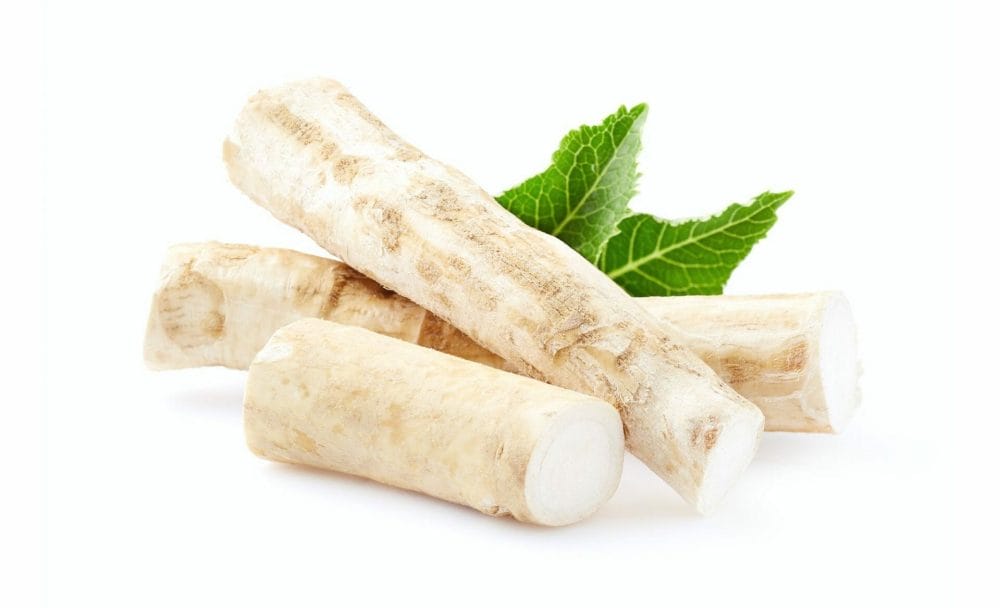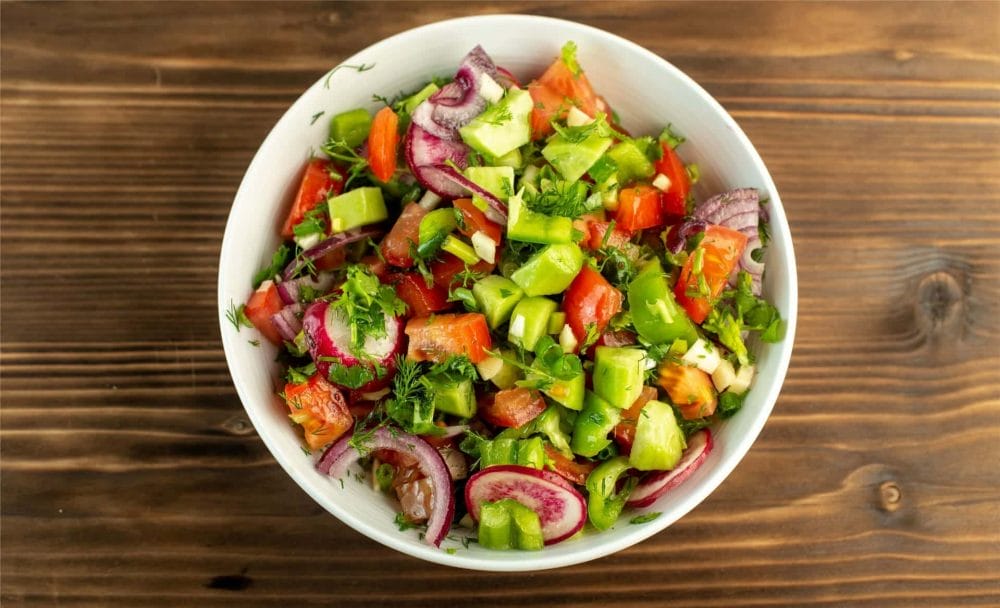
Horseradish is an aromatic and versatile root vegetable. It is famous for its culinary contributions and potential health benefits. If you are eager to learn about horseradish, you are in the right spot. This article delves into the nutritional profile of horseradish and explores its beneficial properties. We will also examine the possible side effects and precautions associated with horseradish consumption.
What is horseradish?
Horseradish (Armoracia rusticana or Moringa) is a perennial root vegetable from the Brassicaceae family. Native to Eastern Europe, horseradish has gained global recognition for its long, tapered white roots that emit a powerful and characteristic aroma when grated or ground. Traditionally used as a condiment, horseradish’s potent taste has found its place in various culinary traditions.
Beyond its culinary use, horseradish is also famous for its health benefits because of its rich composition of bioactive compounds associated with physiological advantages. Whether enjoyed as a palate-stimulating addition to meals or considered for its potential wellness contributions, horseradish is a testament to gustatory delight and potential nutritional value. [2]
Health benefits of horseradish
Horseradish offers the following health benefits owing to its rich composition of bioactive compounds.
- Respiratory relief
Horseradish’s mucolytic properties make it valuable in treating bronchitis and sinusitis by easing respiratory congestion. [1]
- Urinary bladder health
Horseradish has been recognized for its potential to address urinary bladder infections, contributing to improved urinary tract health. [1]
- Pain management
The horseradish root’s application extends to pain alleviation, providing relief from conditions like sciatica and rheumatism. [1]
- Topical analgesic
Creating a paste from grated horseradish roots or leaves and applying it on the skin through cloth harnesses its topical analgesic potential. [1]
- Wound healing
Horseradish leaves have historically found use for wound management due to their purported wound-healing attributes. [1]
- Inflammation treatment
It shows promise in treating breast and skin inflammations, possibly attributed to its anti-inflammatory constituents. [1]
- Respiratory support
Functioning as an expectorant, horseradish aids in soothing respiratory issues. Its syrup is a potent cough remedy. [1]
- Historical nutritional remedy
Historical records indicate horseradish’s use in addressing scurvy due to its high ascorbic acid content. [1]
- Rich nutritional profile
Horseradish boasts a wealth of phenolics, vitamins, and minerals, often surpassing citrus fruits in vitamin C content. [1]
- Antioxidant activity
Its intricate mix of phenolic compounds confers antioxidant capabilities, proving effective against pancreatic lipase. [1]
- Oral health
Diluted horseradish juice is an antibiotic mouthwash aiding in treating oral conditions like periodontal disease. [1]

- Modern applications
Horseradish’s constituents have entered modern pharmaceuticals, including anticancer drugs and functional foods. It showcases its adaptability to contemporary health needs.
Uses of Horseradish
Horseradish has been revered for centuries for its capacity to elevate the gustatory experience of various culinary creations. Its versatility lends itself to the following applications that go beyond mere seasoning.
- Flavor enhancement
A timeless culinary companion, horseradish imparts a distinctive pungent kick to augment the flavor profiles of diverse dishes. [1]
- Condiment creations
Horseradish finds its place as a condiment, often transformed into pastes or sauces that provide an intense flavor addition to meals. [1]
- Salad ingredient
It serves as a unique and zesty ingredient in salads, contributing a tangy note that complements a variety of vegetables and greens. [1]

- Pickling
It finds use in the pickling process, notably with pears, where its presence imparts flavor and contributes to preserving the pickled pears for approximately 6 to 8 months. [1]
- Hangover remedy
The juice derived from pickled pears infused with horseradish has found an intriguing utilization as a potential hangover remedy. [1]
- Fermentation
Horseradish’s potency extends to fermented plant products, harmoniously combining with ingredients like cabbage and tomato to yield dynamic flavors in fermented dishes.
Side effects of horseradish
While horseradish brings many potential health benefits, exercising caution and moderation is crucial due to the following side effects that can arise from its consumption.
- Moderation
Given its potent nature, you must use horseradish judiciously. Using it sparingly can help mitigate the risk of encountering adverse effects.
- Irritation potential
The intense spiciness inherent to horseradish can lead to mouth, nose, and stomach irritation when consumed in excessive quantities.
- Digestive distress
Individuals with preexisting digestive conditions, like stomach ulcers and digestive issues, may be vulnerable to the irritative effects of horseradish. Overindulgence may exacerbate these conditions and lead to discomfort.
Comprehensive information regarding the potential side effects of excessive horseradish consumption remains relatively scarce within available literature.
Ayurveda and horseradish
In Ayurveda, horseradish is notable for its unique attributes and potential therapeutic applications. Known as “shigru” in Sanskrit, horseradish is famous for its spicy and heating qualities, aligning it with the “pungent” (katu) taste category in the Ayurvedic classification. Its taste can stimulate digestive fire (agni) and promote metabolism.
In Ayurvedic principles, people know horseradish for possessing properties that can balance Kapha dosha due to its stimulating and warming nature. It has traditionally been used to alleviate congestion and support respiratory health. However, as with any Ayurvedic remedy, its usage is within the context of an individual’s constitution (prakriti) and current imbalances (vikriti), ensuring a personalized approach to wellbeing.
FAQs
• What does horseradish do for the body?
Horseradish offers many potential benefits to the body. Its bioactive compounds, including glucosinolates, provide antioxidant and anti-inflammatory properties that may support overall health. Horseradish has been historically associated with respiratory relief, aiding in congestion and respiratory issues. Additionally, its pungent nature can stimulate digestion and metabolism.
• Is it good to eat horseradish every day?
Consuming horseradish in moderation can be part of a balanced diet. However, due to its potent and pungent flavor, it’s best to use it sparingly. Eating horseradish daily can be excessive for some individuals, as its intense taste could lead to mouth, nose, or stomach irritation. Individuals with certain health conditions should consult their healthcare provider before making it a daily dietary habit.
• Who should not eat horseradish?
Individuals with some medical conditions should be mindful when consuming horseradish. Its aromatic nature may exacerbate issues for those with stomach ulcers, digestive problems, or inflammatory bowel disease. Additionally, those sensitive to spicy or pungent foods might find horseradish uncomfortable to consume.
• Is horseradish a superfood?
Horseradish is not typically a superfood in the same way as kale or blueberries. However, it does offer unique nutritional qualities. It’s a source of vitamins, minerals, and antioxidants, contributing to its potential health benefits.
• Is horseradish good for the liver?
Horseradish’s potential benefits for liver health are not extensively studied. There is limited scientific evidence specifically linking horseradish consumption to liver health. However, horseradish contains compounds like glucosinolates that possess antioxidant properties, which could positively impact overall health, including liver function. As with any health-related consideration, consulting a healthcare professional for personalized advice is advisable.
Conclusion
Horseradish is a remarkable example of nature’s multifaceted offerings. As a root vegetable, it transcends culinary applications to offer potential health benefits. Its distinctive pungency and historical significance in various cultures attest to its enduring allure in kitchens worldwide. While its nutritional profile and bioactive compounds are sources of intrigue, moderation and individual health considerations are crucial.
Disclaimer
The information provided here does not intend to replace professional advice or treatment.
References


















